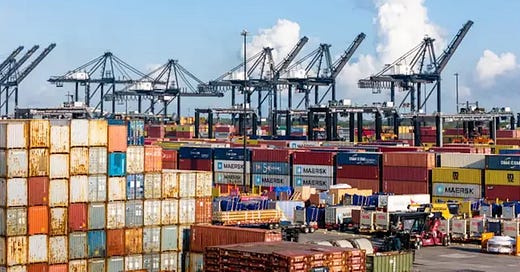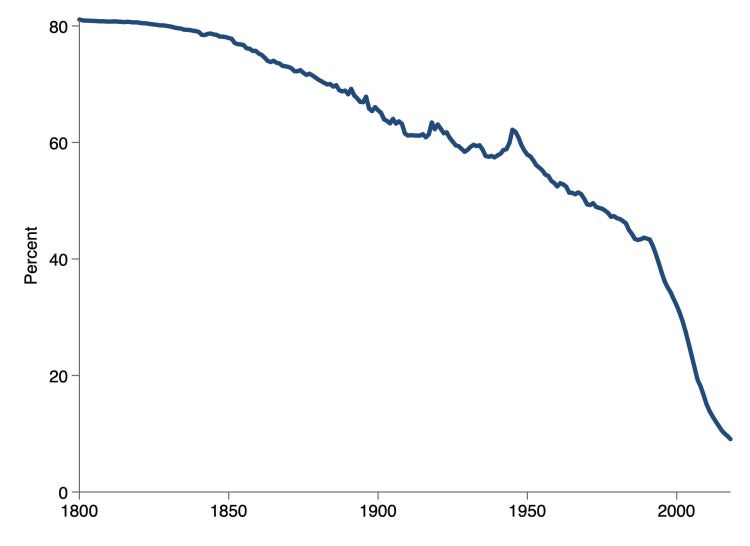The International Longshoremen's Association (ILA) recently (and briefly) went on strike. 47,000 port workers at 36 US ports are demanding a substantial raise... and a total ban on automation.
The strike, which threatened supply chains, retail shelves, and the domestic economy, came at a bad time for the incumbents in the White House. The economy, already the number one issue for many and perhaps most voters, would not react well to a protracted interruption in the flow of goods from suppliers to consumers.
Reports are that somebody said something to somebody as to all that, so the threat ended early. With the union getting a chunk of the raise it wanted, conceding nothing as to its demands for a moratorium on automation, and positioned to strike again three months from now. That the contract was only extended to January 15, 2025 stinks like month-old fish.
Let’s take a look beyond the realpolitik and back room deals at the big picture, ahead of the fight that they simply punted three months downfield.
I take a neutral stance on the employer-union relationship, with the proviso that there must be no violence. In decades past, both management and labor have been guilty of violence, both implied and overt. In more recent times, that violence has mostly been monopolized by the government, which has assumed overlord status in most employment relationships. And by violence I mean the basket of oversight agencies, labor laws, interveners, arbitrators, mediators, and legislators whose rules and actions are coercive. Remember - all government mandates are backed by the threat of violence. Don't comply, and you can be fined and/or prosecuted. Don't pay, and your wealth can be seized. Don't go along willingly when the cops show up, and you can be grabbed, pinned to the ground, handcuffed, and hauled off to jail. Government action is always backed with the threat of violence.
That lesson in liberty aside, I've no problem with workers organizing to speak with a collective voice, provided they do so willingly (see, among other things, "right-to-work" laws).
And, I've no problem with workers asking for raises.
Where I break with them is in their demands that automation be slowed or halted.
Yes, it sucks to be downsized or obsoleted out of a job or career. Yes, it can be life-altering for someone in his fifties to suddenly find himself out of work and with a skillset that is no longer useful.
And, yes, the sympathetic part of each of us wants something to be done to help and protect such people.
The caveat is that the sort of protection such as the ILA demand hurts everyone else.
Automation is part of how economies grow, societies evolve, and living standards increase. Automation is at the heart of the Industrial Revolution that, across the past two and a half centuries, advanced human living standards by leaps and bounds compared to the previous six millennia of civilization. As one source put it, the world started getting rich.
At the start of the nineteenth century, three in four American laborers worked on farms. As automation acted as a labor multiplier, one worker with a machine could do the job of many, and today, fewer than 3% of US laborers work on farms.
This phenomenon has happened everywhere since humans learned how to translate stored energy in the form of wood, flowing water, the wind, coal, oil, natural gas, the sun, and the atom into beneficial activity. It's not just farmhands that have been displaced, either. Buggy whip makers, icebox delivery drivers, telephone, telegraph, switchboard, and elevator operators, lamplighters, and stenographers have all gone the way of the dodo. Countless other jobs, such as secretaries, typists, cashiers, assembly line workers, miners, data entry clerks, travel agents, blacksmiths, farriers, and carriage makers have been greatly reduced in population.
The streets are not flooded with unemployed, however. When healthy, our economy has reached full employment many times across these centuries. Moreover, the poverty rate, both in the US and across the world, has steadily dropped.
Remember the big mess at the ports during the pandemic? A huge contributor was union protectionism in the Long Beach, CA port, and union rules for truckers in California. Already, domestic ports greatly lag ports in the rest of the world in terms of efficiency, thanks to successful union resistance to automation, and Americans have suffered as a result.
Now, on to the interesting part of all this.
The Teamsters union, before the deal was struck, publicly told President Biden, who has spent his entire career cozying up to the unions and is protectionist to the depths of his soul, to fuck off, Literally. Likely out of fear that Biden and his handlers will realize that this strike does not help Harris and Taft-Hartley the union.
The Teamsters bosses, playing further games, have opted not to endorse a Presidential candidate, breaking with long-standing tradition of siding with their cronies in the Democratic Party, and pissing off their very Trumpy rank and file.
Meanwhile, my social media feed is littered with variations of:
Fun Fact: American made products don't get stuck on cargo ships.
from people leaning right. The implication of that statement is that "bring the jobs home" protectionism is an antidote to "hold the containers hostage to save our jobs" protectionism the ILA is seeking.
Left-protectionists vs right-protectionists, with free-traders left out in the cold.
AKA the script of the past two Presidencies.
Meanwhile, standing in the way of automation is standing in the way of the betterment of humanity. It is also an act of futility. Automation is going to happen, and if a union manages to stop a particular company or entity from automating, that company or entity will eventually be outcompeted by others.
If I were the union bosses and I wished to serve my members, I'd be looking for nice exit packages for down-sized rank-and-file, not a ban on automation. Of course, that means fewer members, and fewer dues, and less lavish digs for the bosses. No surprise, the ILA boss who is bragging about his power to cripple the American economy is almost as old as Biden, and is still shaking his fist at that awful job killer, EZPass.
Container shipping began in 1956. Prior to that, dock worker would load boxes, crates, barrels, and the like manually, with the help of cranes and such. Containerization revolutionized shipping.
It also displaced thousands of longshoremen.
Knowing what we know today, would anyone think it would have been a good idea to prohibit containerization?







Excellent article! As I have oft stated, human history canned be summarized as follows: someone is always coming up with a better way to do things; and the folks who did it the old way will resist.